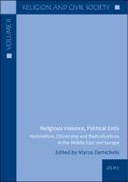Explore

Religious Violence, Political Ends
0 Ungluers have
Faved this Work
Login to Fave
Politisch begründete religiöse Gewalt war und ist seit der Antike eine gängige Praxis: Die Gräueltaten des Römischen Reiches gegenüber frühchristlichen Gemeinschaften wurden schnell durch nicht minder aggressive Handlungen gegenüber nicht-christlichen Gläubigen ersetzt, denen abscheuliche und polytheistische Praktiken vorgeworfen wurden. Mit dem Aufkommen der Moderne hat die Homogenisierung der religiösen Sphäre für politisch-ökonomische Zwecke, die Vernichtung jeder Form von Häresie und die Ausbreitung des Protestantismus, des Calvinismus und des Anglikanismus eine Umstrukturierung und Konzeptualisierung der westeuropäischen Staaten bewirkt, ganz nach der Devise „ein Königreich, mit einer Religion und einer Nation“. Das Ende der Religionskriege (1648), die Westfälische Souveränität und der Cuius Regio Eius Religio hatten Einfluss auf die Bildung des modernen Europa und anderer Regionen, der französisch-britische Kolonialismus zwang dabei dem gesamten Nahen Osten und der islamischen Welt das gleiche System auf. Der vorliegende Band widmet sich der Untersuchung von interreligiöser Gewalt, religiösem Sektierertum und Islamophobie auf theoretischer Basis, verbunden mit dem „Kampf der Kulturen“ und dem „Religiösen Nationalismus“, als Ausdrücken präziser politischer Ziele, mit denen die Erhaltung der Fragmentierung und der kriegerischen Auseinandersetzungen im Osten sowie das Schüren von Ängsten und Vorurteilen im Westen verfolgt werden.
Religious violence due to political reasons has been a common practice since ancient times: The massacres of early Christian communities, carried out by the Roman Empire, were rapidly replaced by equally harsh measures against non-Christian believers, being accused of abominable and polytheistic practises. The advent of the modern age, the homogenization of the religious sphere for political-economic ends, the annihilation of any kind of heresy and the emergence of Protestantism, Calvinism and Anglicanism restructured the conceptualization of the Western European States emphasizing the adage “one kingdom, with one religion and one nation”. The end of the religious wars (1648), the Westphalian sovereignty and the Cuius Regio Eius Religio had an impact on the formation of Europe and other regions, the Franco-British colonialism imposed the same system on the entire Middle Eastern and Islamic World. This volume thoroughly examines the usage of inter-religious violence, religious sectarianism and Islamophobia on a theoretical basis, linked with “Clashes of Civilizations” and “Religious Nationalism”, and describes them as manifestations of precise political ends, aiming to preserve fragmentation and warlike states in the East as well as fear and prejudices in the West.
This book is included in DOAB.
Why read this book? Have your say.
You must be logged in to comment.
Rights Information
Are you the author or publisher of this work? If so, you can claim it as yours by registering as an Unglue.it rights holder.Downloads
This work has been downloaded 43 times via unglue.it ebook links.
- 43 - pdf (CC BY-NC-ND) at OAPEN Library.
Keywords
- Agriculture
- Agriculture & Farming
- History
- history of religion
- Humanities
- Religion
- Religion & beliefs
- Religion: general
- Technology & Engineering
- Technology, engineering, agriculture
- thema EDItEUR::Q Philosophy and Religion::QR Religion and beliefs::QRA Religion: general::QRAX History of religion
Editions

